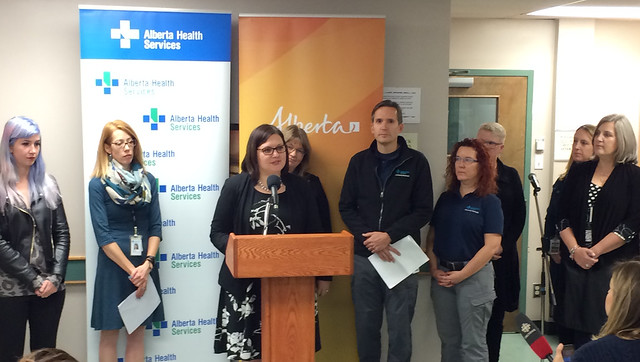This release was issued under a previous government.

Associate Minister of Health Brandy Payne announces expanded opioid dependency treatment in Calgary's Renfrew Recovery Centre.
In addition, expanded paramedic and mobile outreach teams in Alberta’s two largest cities will also link people at risk of opioid overdose to the help and resources they need in the community.
“Our government is doing everything we can to combat the opioid crisis in Alberta. This is one step in a much larger effort to keep Albertans safe and healthy and to support those who are dealing with substance use. This expansion will eliminate most wait times and improve access through specialty clinics, detox facilities and front-line care teams such as the City Centre Community Paramedic Team in Calgary.”
Funding of $4.6 million will ensure that more people can receive Suboxone or methadone treatment and counselling in Calgary and Edmonton. This funding includes $2.2 million for the Calgary region and $2.4 million for the Edmonton region.
All of the expanded services will be available by the end of October.
"I believe in educating and dispelling the myths surrounding medication-assisted treatment for addiction. I have successfully been on a methadone program for many years now. It saved my life. I have my life back from addiction and truly love myself now."
Alberta Health Services is expanding access to opioid treatment in Calgary by:
- Providing medication-assisted therapy at the Renfrew Recovery Centre for up to 180 new patients each year. Once patients are stabilized on Suboxone – a drug used to treat people with opioid use disorder – they will be linked to a community opioid dependency clinic to receive ongoing care, counselling and social services.
- Expanding the hours, staff and services at the opioid dependency clinic at the Sheldon M. Chumir Health Centre, allowing the centre to serve an additional 240 clients, up from the current 444.
- Opening eight new medical detox beds at Alpha House, from which clients will be able to access opioid replacement treatment. The new beds mean an additional 250 clients will receive care each year.
- Expanding access to Suboxone and methadone treatment and mental health services at Calgary Urban Project Society (CUPS), which provides treatment for low-income Calgarians, including those experiencing homelessness. This program will provide services to 250 patients annually.
- Adding medication-assisted therapy to the services offered at the Alex, which will also help up to 250 people each year.
- Expanding the hours of operation of the Community Paramedic City Centre Team to seven days a week, 12 hours a day. Up to 1,500 additional patients will be helped each year as the paramedic team links them with community resources.
“This funding, which will enable Calgarians to access opioid replacement therapy in detox, brings us in line with new national standards to treat opioid use disorder, reflects the latest evidence, and most importantly will save lives.”
“Any delay or obstacle in reaching treatment for opioid use disorder can result in relapse or lost opportunity - both potentially fatal. The funding of the expansion of the City Centre Team brings mobile life-preserving treatment to vulnerable patients when they need it most wherever they are.”
Another $2.4-million grant for AHS in Edmonton will:
- Enhance detoxification services at the AHS Addiction Recovery Centre, allowing additional nurses to offer medication-assisted therapy to approximately 800 people struggling with complex substance use dependency.
- Provide opioid dependency treatment, including medication-assisted therapy, to approximately 360 more clients each year through additional staff at the Boyle McCauley Health Centre.
- Allow the Opioid Dependency Clinic in Edmonton to expand its hours to accept approximately 150 new patients.
- Expand the mobile harm-reduction outreach program to allow followup with patients discharged after an opioid overdose. The outreach team will also help people at risk by ensuring they have access to overdose prevention training, naloxone kits and community resources. The expansion will help up to 2,200 additional people each year.
“This new funding is vital to support Albertans who may be struggling with substance use. By working with our partners to expand existing programs and develop new treatment and harm-reduction strategies, together, we can deliver care and treatment where it is needed the most.”
Quick facts
- The hours for the AHS Opioid Dependency Treatment program at the Sheldon M. Chumir Health Centre are being expanded to 6:30 a.m. to 4:15 p.m., up from the previous hours of 7 a.m. to 2:30 p.m. Five new staff are also being added – an addiction counsellor, registered nurse, lab assistant, nurse practitioner and mental health therapist.
- The hours for the AHS Opioid Dependency Treatment clinic in Edmonton are being expanded to 7 a.m. to 7 p.m., up from 7:15 a.m. to 3:15 p.m., allowing evening intake for new patients. Five new staff are also being added - two nurses, one technical attendant, one client technician and one social worker.
- In spring 2017, the Alberta government opened the first AHS opioid dependency treatment clinics in central Alberta and Grande Prairie, each of which can treat up to 300 patients.
- Government continues to work with family doctors and primary care providers to increase access to medication-assisted therapy in the community.
- A new opioid medical analyst from the Public Health Agency of Canada is working with Alberta’s Chief Medical Examiner’s office to delve deeper into opioid-related statistics and data. This information will help government and the Minister's Opioid Emergency Response Commission tailor their actions to address the opioid crisis moving forward.
Note: The expanded treatment at individual clinics will serve 2,480 new patients annually. The expanded mobile outreach in Calgary and Edmonton will provide up to 3,700 new patient visits each year. Some will be repeat visits.